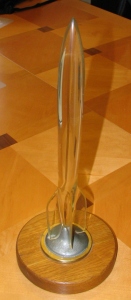Hugo Award facts for kids
The Hugo Award is a really cool prize given out every year for the best science fiction or fantasy stories, books, and other works from the year before. It's like the Oscars for amazing futuristic adventures and magical tales! The award is named after Hugo Gernsback, who started the first big science fiction magazine called Amazing Stories.
Hugo Awards have been given out almost every year since 1953. The winners are chosen by fans who are members of a huge meeting called Worldcon. The special party where the awards are given out is a big part of the Worldcon event each year.
The shiny Hugo Award trophy was designed by a person named Benedict Jablonski along with others.
Contents
What are the Hugo Awards?
The Hugo Awards celebrate the best in science fiction and fantasy. They recognize many different types of creative work. This includes novels, short stories, art, and even movies or TV shows. The awards are a way to honor the amazing talent in these genres.
Who Chooses the Winners?
The winners of the Hugo Awards are chosen by the people who attend Worldcon. Worldcon is the World Science Fiction Convention. It's a big gathering of science fiction and fantasy fans from all over the world. Members of Worldcon get to nominate their favorite works. Then, they vote for the final winners. This makes the Hugo Awards truly special. They are chosen by the fans themselves!
The Hugo Award Ceremony
The Hugo Award ceremony is a very exciting event. It happens during the Worldcon convention each year. It's a bit like a big party where everyone celebrates the winners. For example, the 2006 Hugo Awards ceremony was held at the 64th World Science Fiction Convention in Anaheim, California. The awards in 2007 were given out in Yokohama, Japan, on 1 September. These ceremonies are a highlight for many fans.
Images for kids
-
Hugo Awards through the years exhibited in Helsinki, 2017.
-
David Hartwell, Charles N. Brown, and Connie Willis pose with the 2008 Hugo Awards
See also
 In Spanish: Premios Hugo para niños
In Spanish: Premios Hugo para niños
 | Shirley Ann Jackson |
 | Garett Morgan |
 | J. Ernest Wilkins Jr. |
 | Elijah McCoy |




